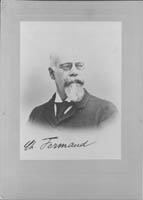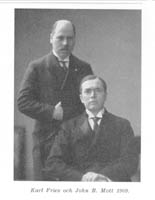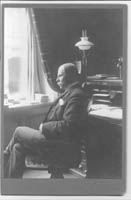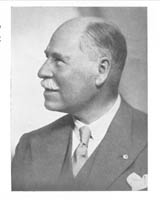Table of Contents
Key Figures
YMCA Secretaries
a | b | c | d | e | f | g | h | j | k | l | m | n-o | p | r | s | t-u | v | w | y-z
Charles Fermaud
One of the key leaders in the Association Movement in Europe, Fermaud was a volunteer in the Geneva Association prior to the Eighth World's Conference in August 1878. He played an important role in organizing the convention and was elected President of the World's Committee. Fermaud led the world-wide expansion of the YMCA, although he had no model for such growth and had to be innovative. Later in 1878, Fermaud became the General Secretary of the World's Alliance of YMCA's, a position he would hold for thirty-four years. During his first overseas visit to the United States, Great Britain, Scotland, and Ireland, during the Spring and Summer of 1879, Fermaud promoted the development of the Association. Like John R. Mott, Fermaud traveled the globe and was instrumental in establishing YMCA's in Hungary and Bulgaria. He resigned from the General Secretary position in 1912, leaving Christian Phildius and Emmanuel Sautter to assume his duties.
William Finger
One of fifteen American Rhodes Scholars at Oxford University who volunteered for post-war YMCA service to provide relief to Russian and Central Power prisoners of war during the repatriation process in the Baltic region during the Summer of 1920. Finger conducted War Prisoners Aid operations on board transport ships carrying former POW's and refugees between the German port of Stettin and Narva, Estonia, Riga, Latvia, and Björkö, Finland.
Karl Fries (1861-1943)
A Swedish ecumenical leader, Dr. Fries was an important leader in student missionary work. He learned German in Leipzig and planned to become a missionary. Fries then attended the University of Uppsala and in 1884 was one of the founding members of the Students' Missionary Association. In 1886, Fries joined the local YMCA and attended the organizing meeting of the National Alliance of Swedish YMCA's in Stockholm. The next year he became a temporary secretary for the Stockholm Association. He completed his doctorate in 1892 in preparation of serving as a missionary in Ethiopia. In August 1895, Fries and John R. Mott founded the World's Student Christian Federation (WSCF) at Vadstena, Sweden. The conference included student leaders from Britain, Sweden, Norway, Germany, and the United States and marked the establishment of the WSCF, an organization designed to conduct Christian missionary work among students around the world. Fries became the WSCF's first president and Mott served as the first General Secretary. In 1905, the WSCF became an interconfessional movement in which all Christian faiths received equal status within the organization. When World War I began, Fries worked closely with Mott to establish the War Prisoners' Aid program in belligerent nations and helped recruit neutral secretaries to replace American WPA Secretaries after the United States entered the war. Fries often accompanied Mott during his wartime tours of prison camps in Europe. The WSCF provided relief services to students during the war and the post-war reconstruction period. After the war, Fries worked to heal the rifts between the American YMCA and the World's Committee in Geneva as well as the deep divisions between the French and German Associations. In 1921, Fries became the General Secretary of the World's Committee and served in that capacity until 1926.
J. G. Fritschi
This Swiss YMCA secretary volunteered to serve as a World's Alliance War Prisoners Aid Secretary in Bulgaria during World War I. Fritschi conducted prisoner of war relief work in Varna, Schumen, Dobritch, Eski-Djoumaja, and Rassgard. He was one of the co-authors of the protocol, which was formulated during monthly WPA meetings in Sofia starting in January 1918, which served as the basis for POW service in Bulgaria.
Karl Füchtner
An Austrian YMCA secretary, Füchtner supervised the Vienna Association from 1906 to 1911. During his tenure, he established a building fund which permitted the Austrian YMCA to construct its own facility in the imperial capital in 1912.
D. N. Furnajieff
A Bulgarian pastor, Reverend Furnajieff was instrumental in the establishment of the Association in the kingdom. He attended the Thirteenth World's Conference in Edinburgh in June 1913, where he called on the World's Alliance to help develop the YMCA in Sofia. The World's Committee responded by dispatching Henri Johannot, who spoke Bulgarian, to serve as a full time Association and World's Student Christian Federation Secretary. Furnajieff became the President of the National Committee of the Bulgarian YMCA. When Bulgaria entered the war in 1915, Furnajieff sent another appeal to the World's Committee to send welfare assistance to the kingdom. He sought secretaries and funding to provide war work for Bulgarian soldiers, including a supply of Bibles for distribution to the troops. Furnajieff strongly supported the establishment of War Prisoners' Aid relief for Allied POW's in Bulgaria and worked on behalf of the World's Committee to gain the support of the Bulgarian government.



